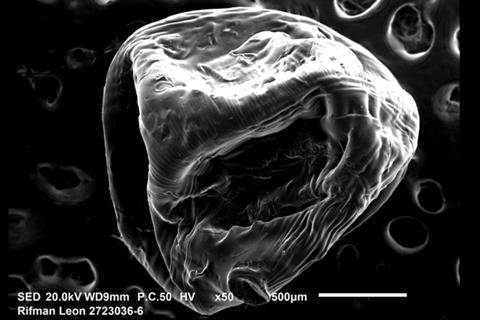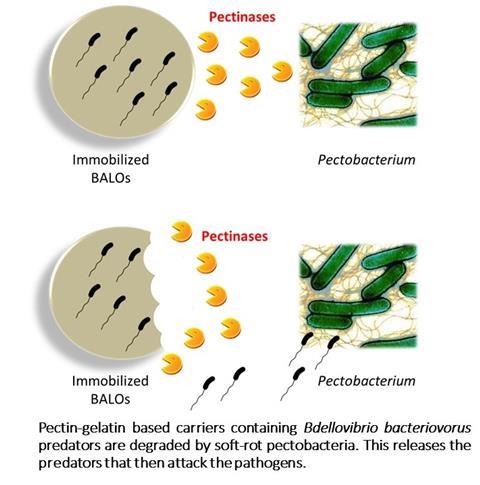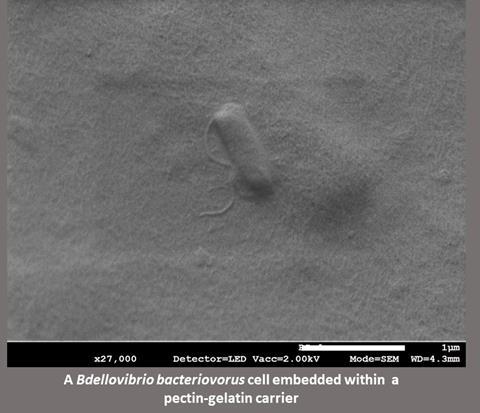Researchers in Israel have come up with a way to turn the weapons of potato soft-rot pathogens against themselves, unleashing an army of predatory bacteria that can destroy the pathogens.
The team have created pectin-based carriers that contain predatory bacteria and are degraded by the potato soft-rot pathogens. On release, the predators attack the pathogens.

The study is outlined in ‘Self-demise of soft rot bacteria by activation of microbial predators by pectin-based carriers’ which has been accepted for Microbial Biotechnology [LINK], an Applied Microbiology International publication.
Food security
Lead author Edouard Jurkevitch explains that potato is the biggest non-cereal staple crop in the world, but up to 30% of the crop may be lost to diseases. A major threat among these are soft-rots caused by bacterial pathogens.
”Potato is a vital food-security staple crop and the third most important food crop after rice and wheat with more than a billion consumers worldwide. Reducing potato yield loss can increase worldwide food security,” he says.
“Currently, there is no effective control that can reduce or prevent bacterial outbreaks in contaminated tubers or fields.”
Protective predator
“Soft-rot bacteria are Gram-negative, rod shaped bacteria that may be used as prey for bacterial predators of the genus Bdellovibrio, mainly B. bacteriovorus. When this predator is present at the right time and place, it may in turn protect potatoes from the disease.”
Soft-rot bacteria cause disease by employing an arsenal of plant cell wall-degrading enzymes (PCWDE) that are secreted from the cell and macerate the plant tissues, allowing the bacteria to obtain nutrients for growth and multiplication.
The most important PCDWEs in soft rot bacteria are those that break down pectin, a main structural component of the plant cell wall.
Pectin-based carrier
Researchers at the Faculty of Agriculture, Food and Environment at the Hebrew University of Jerusalem and the Agricultural Research Organization, Volcani Institute, suggested that pectin-based carriers containing B. bacteriovorus predators could be degraded by PCWDEs that are produced and secreted by soft-rot bacteria upon feeding. Once the pectin is degraded by the prey, the predators are released from the carriers, and may prey freely on the pathogens.

“We showed that pectin-based carriers can carry large numbers of predators, and induce the production of PCWDEs in the prey, which in turn degrades the carriers, and releases the tiny hunters. The predators emerging out of their Trojan horse, then attack the pathogen, while efficiently reducing its population to very low levels,” Prof. Jurkevitch says.
Field conditions
The next step, he adds, will be to test these pectin-based carriers in field experiments under natural conditions.

This study was led by Edouard Jurkevitch in collaboration with Amos Nussinovitch and Iris Yedidia, and was supported by a Grant of the Israeli Ministry of Agriculture in the frame of the Nitzan Program.
‘Self-demise of soft rot bacteria by activation of microbial predators by pectin-based carriers’ appears in Microbial Biotechnology [LINK].
Topics
- Agriculture
- Amos Nussinovitch
- Applied Microbiology International
- Bacteria
- Bdellovibrio bacteriovorus
- Community
- Edouard Jurkevitch
- Fungi
- Healthy Land
- Hebrew University of Jerusalem
- Iris Yedidia
- Israeli Ministry of Agriculture
- Middle East & Africa
- PCWDEs
- plant cell wall-degrading enzymes
- potato soft-rot
- predatory bacteria
- Research News
- Volcani Institute







No comments yet